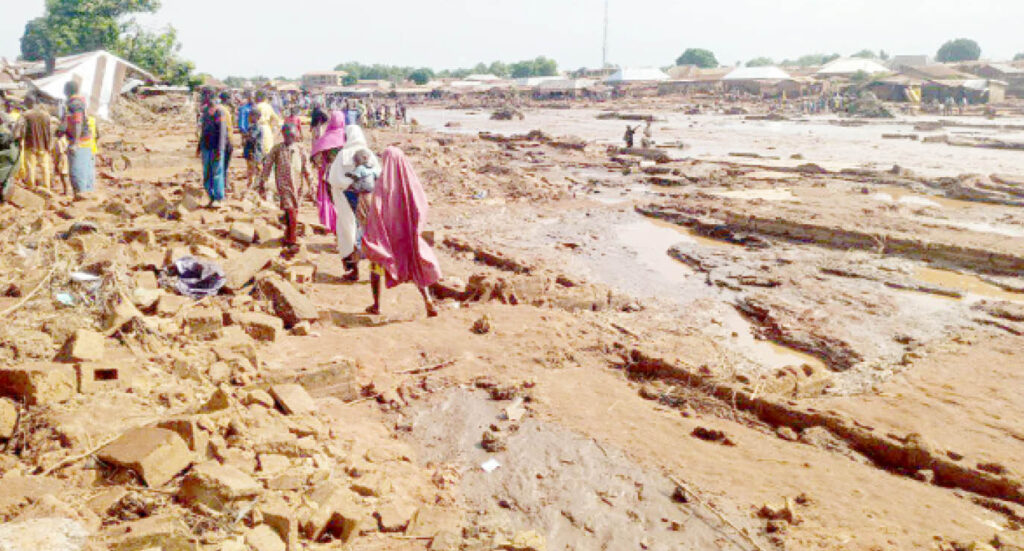[ad_1]
On May 28, 2025, the tranquil town of Mokwa in Niger State was transformed into a scene of devastation when floodwaters tore through the town. It didn’t just sweep away homes and livelihoods — the flood exposed the growing fragility of our environment and the consequences of decades of neglect.
Over 230 people have been confirmed dead, with another 400 still missing. Families have been shattered, thousands displaced, and farmland — the very lifeblood of the region — has been reduced to soggy ruins. It is, by all accounts, the worst flooding Mokwa has experienced in 60 years. But let’s be clear: this was an act of inaction, of willful ignorance, and of failure in governance and environmental stewardship.
Climate change is no longer a distant threat. For too long, we have spoken of climate change in the future tense, as though it were a storm on the distant horizon. But Mokwa tells us that the storm is here — now. What happened in this small but vital agricultural hub is a painful symptom of a warming planet: erratic and extreme weather patterns, heavier rainfall, and weakened natural and man-made infrastructure.
SPONSOR AD
Across the globe, climate disasters are growing in frequency and intensity, and Nigeria is not immune. Our rivers are swelling, our dams are cracking, and our cities and towns — ill-equipped and poorly planned — are left vulnerable to every downpour.
This environmental neglect fuels human tragedy. What makes the Mokwa flood even more tragic is that it could have been mitigated. Environmental experts had sounded alarms. The Nigerian Meteorological Agency (NiMet) and the Nigerian Hydrological Services Agency (NIHSA) issued early warnings about possible flooding in central Nigeria. But those warnings, as usual, went largely unheeded.
In Mokwa, erratic rains delivered the opening salvo, the real disaster unfolded when a decades‑old dam collapsed on that fateful day after five continuous hours of intense rainfall. The dam—originally designed to regulate seasonal flows—was overwhelmed. Water pressure exceeded its structural capacity, triggering a sudden breach. Within moments, a wall of water surged downstream, drowning households and sweeping away entire neighbourhoods.
This was no ordinary release. Unlike controlled spillways or planned dam discharges, this collapse unleashed unregulated volumes of water. Experts later noted that the dam lacked sufficient spillway capacity and had suffered from deferred maintenance—an unforgivable oversight amid shifting climate patterns. The result: infrastructure built for yesteryear’s rains crumbled under new climate extremes, transforming a weather event into a catastrophe.
As always, the victims of these environmental disasters are the same — the poor, the rural, the voiceless. The price of delay is always paid by them. It’s hard to ignore the underlying message: in Nigeria, we wait for disaster before we respond. Over 10,000 hectares of farmland are gone. Livestock have drowned. Crops have rotted. Entire livelihoods have been obliterated in hours.
Meanwhile, displaced families now huddle in makeshift camps, with inadequate access to food, water, and healthcare. UNICEF has stepped in to provide emergency health support, particularly for children and pregnant women. But how long will they stay? And what happens when the media spotlight moves on?
The state government has donated N25 million in relief materials. A welcome gesture, yes, but a drop in the ocean compared to the scale of need and the billions in damages that will take years to repair.
We cannot continue to act surprised when these disasters happen. They are no longer rare. They are becoming our new normal — unless we change course. We need accountability — and urgent action
Our governments must take environmental forecasts seriously. Early warning systems are useless if they are ignored. State and local authorities must be held accountable for emergency preparedness, dam management, and town planning.
Nigeria must invest in climate-resilient infrastructure. Our drainage systems, dams, bridges, and farmlands must be designed with the realities of climate change in mind. We can no longer rely on 20th-century infrastructure in a 21st-century climate.
Most importantly, there must be a shift in mindset. Environmental protection is not a luxury. It is not just the concern of tree-huggers or academics. It is the difference between life and death, between prosperity and poverty.
The flood in Mokwa is more than a disaster. It is a reckoning. It is a brutal reminder that we are running out of time to adapt, to plan, and to protect.
We owe it to the victims not just to rebuild but to build better. We owe it to the next generation to ensure that this does not happen again — not in Mokwa or the low plains of rivers Niger and Benue around Lokoja, Yola and Makurdi, not in Yenagoa, not in the dry valleys of river Hadejia/Jama’are that experienced devastations in the previous years, and not anywhere in Nigeria.
Our systems are fragile because we allowed them to be. This is a moment for transformation. Let Mokwa be the wake-up call. Let us not wait for the next breach, the next flood. We are running out of time—for lives, for homes, for the very planet. The floodwaters may recede. The pain may dull. But let the lesson remain: nature will not wait for us to get our act together. Nature does not negotiate with apathy. Will we rise?
The question now is: Will we?
Ahmad is an environmental advocate and climate policy analyst and can be reached via [email protected]
Do you want to share a story with us? Do you want to advertise with us? Do you need publicity for a product, service, or event? Contact us on WhatsApp +2348183319097 Email: platformtimes@gmail.com
We are committed to impactful investigative journalism for human interest and social justice. Your donation will help us tell more stories. Kindly donate any amount HERE




